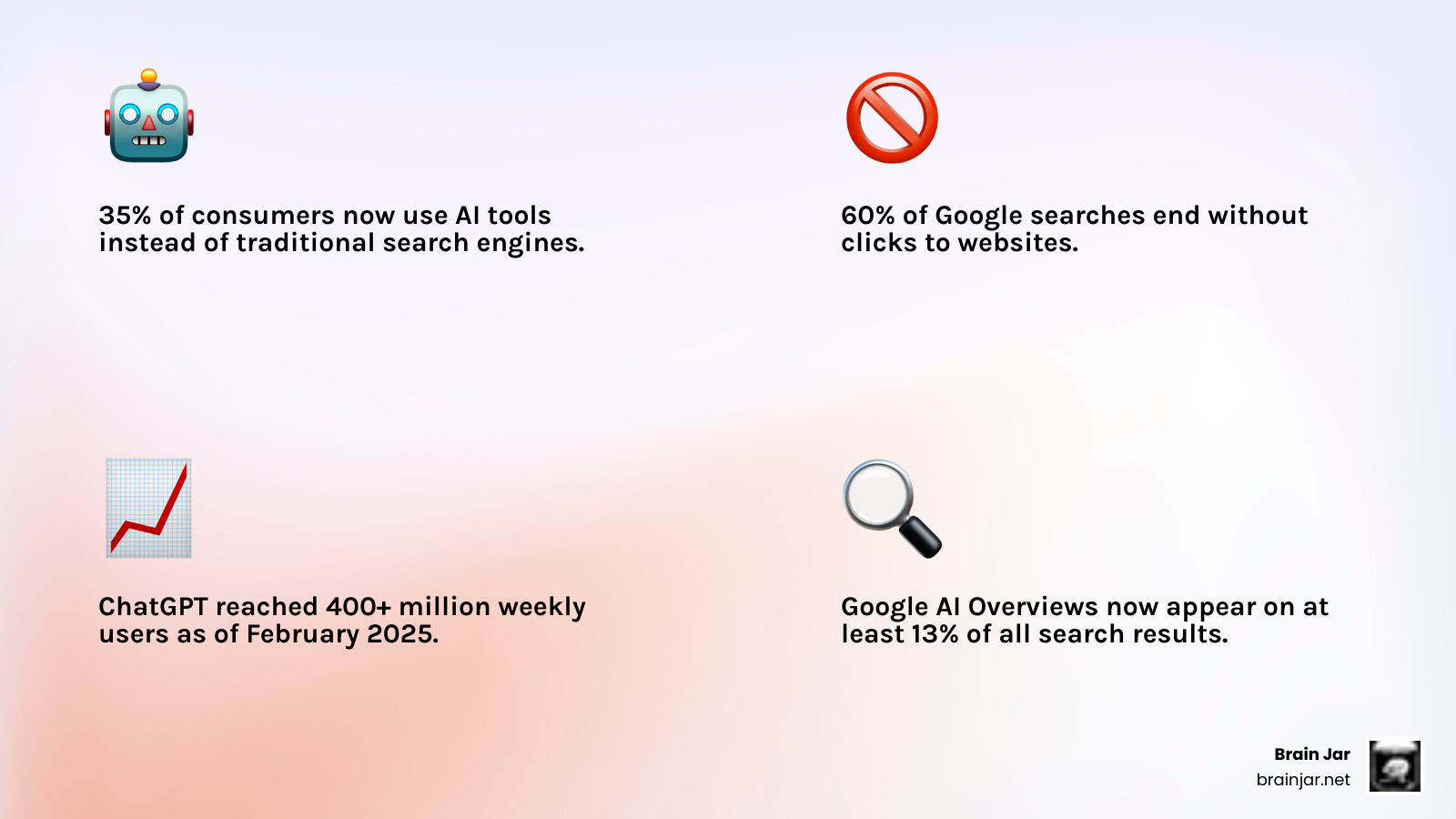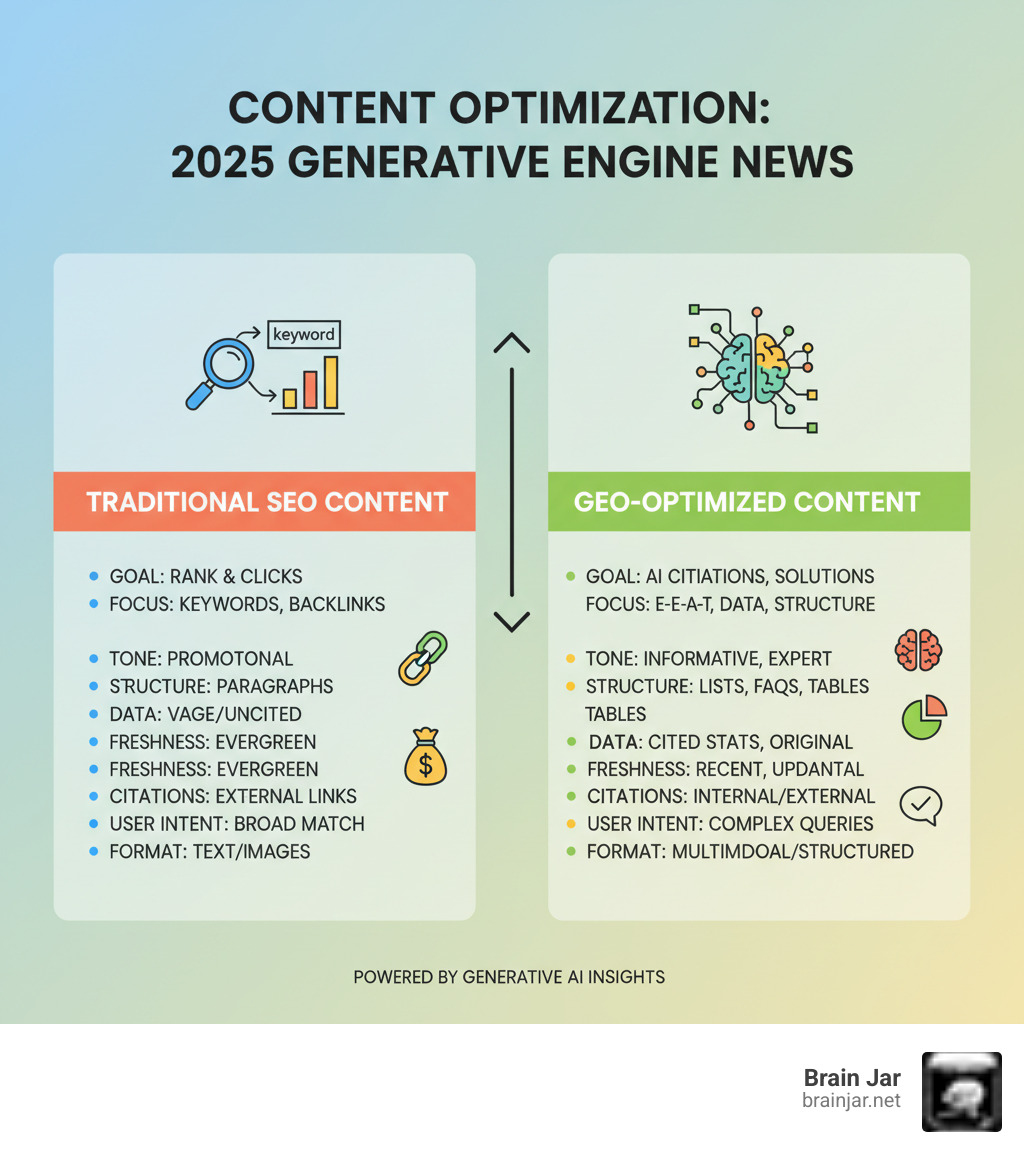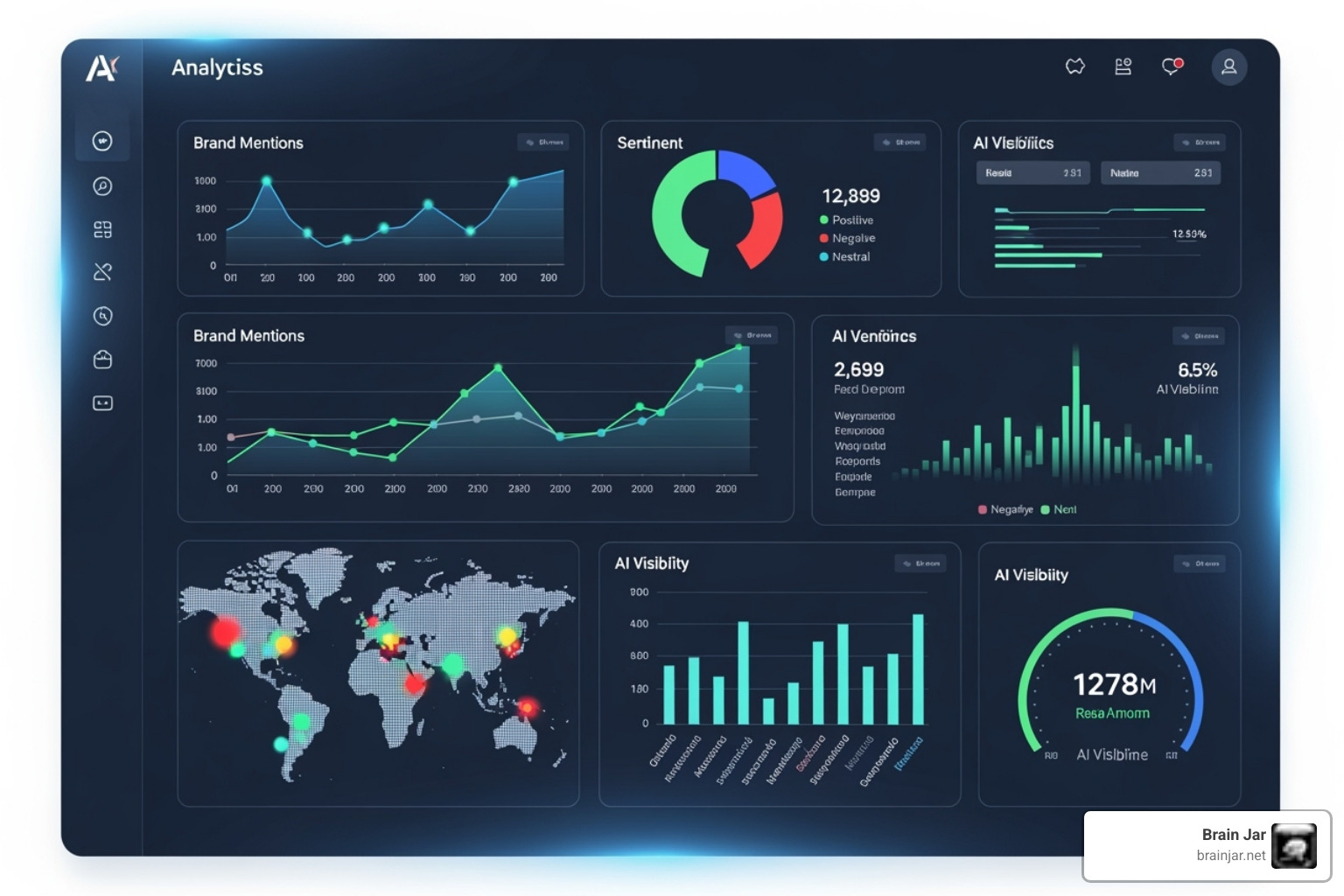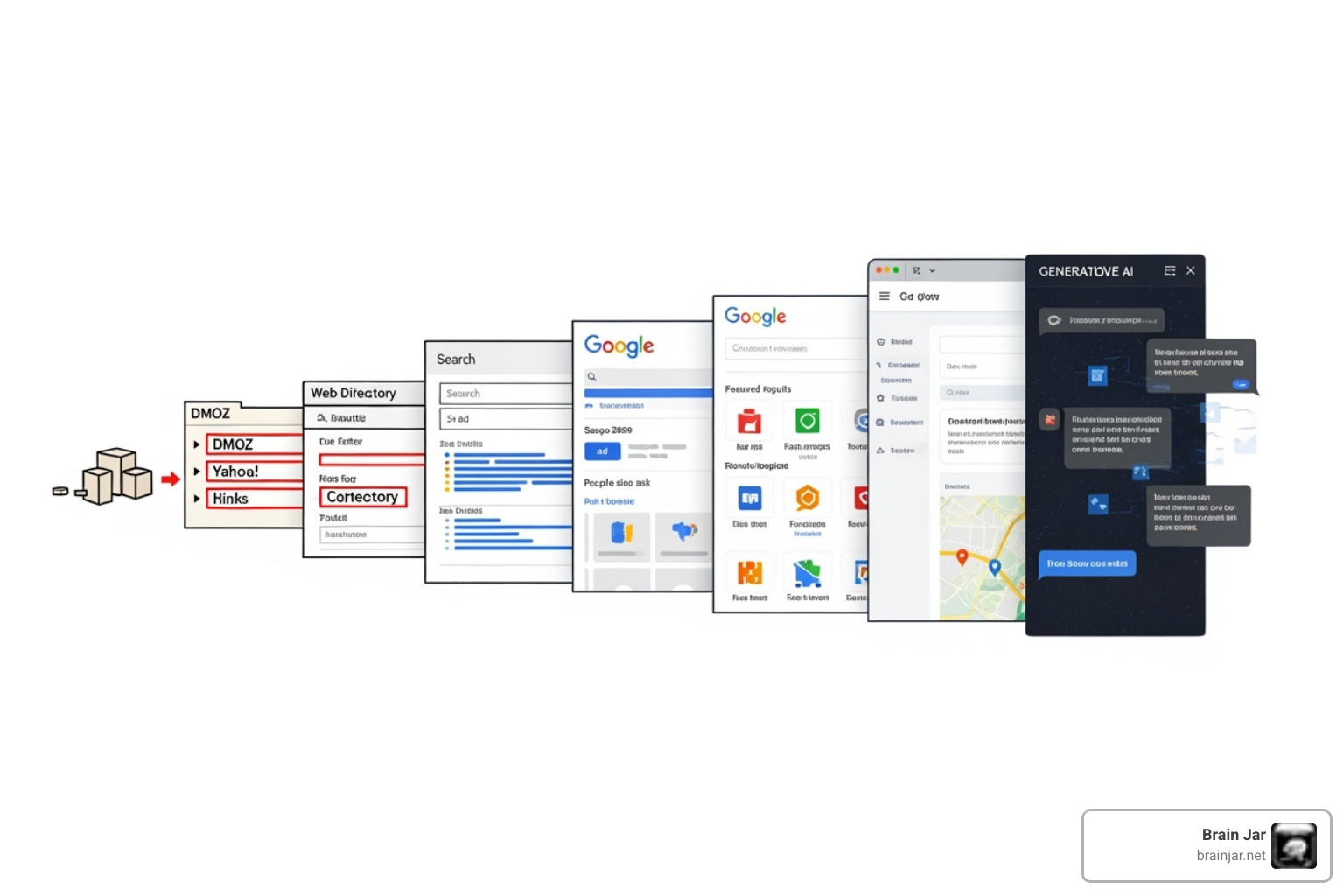Why Search Is Changing Faster Than Ever Before

Generative engine optimization geo news 2025 highlights a seismic shift in how we find information. The data is compelling:
Key GEO Trends for 2025:
- 35% of consumers now use AI tools over traditional search engines.
- 60% of Google searches are zero-click.
- ChatGPT hit 400+ million weekly users by February 2025.
- Google AI Overviews appear on at least 13% of all search results.
- Reddit citations in AI answers surged 450% in three months.
The old SEO playbook of chasing clicks is broken. Generative Engine Optimization (GEO) is the new focus: getting AI engines to cite your content as the authoritative source. This shift from rankings to recommendations is everything. Your goal is no longer to rank #1, but to be the source AI trusts and references in its answers.
The stakes are high. Gartner predicts a 50% drop in traditional organic traffic by 2028. This isn’t just a threat; it’s a massive opportunity for businesses that adapt.

What is Generative Engine Optimization (GEO) and Why Does It Matter?
Generative Engine Optimization (GEO) is the art of creating content that AI engines quote. Instead of optimizing for clicks, you’re positioning your brand as the trusted source for ChatGPT, Google’s AI Overviews, and other AI tools. While traditional SEO aimed for visibility in a list of links, GEO aims to weave your expertise directly into the AI’s response, becoming part of the answer itself.
Most users trust the AI’s synthesized answer rather than clicking through to sources. This makes GEO essential for survival, as generative engine optimization geo news 2025 trends confirm. The core difference is influence versus visibility. GEO focuses on providing comprehensive, authoritative answers to deep user needs, making your content impossible for AI to ignore.
This matters because user behavior has changed. Zero-click searches are the norm, with users getting answers directly from AI interfaces. When 60% of Google searches end without a click, even a #1 ranking can mean invisibility.
The data is clear: ChatGPT has over 400 million weekly users, and Google’s AI Overviews appear on at least 13% of all search results. GEO works with intent rather than just keywords, anticipating the deeper questions your audience has.
GEO doesn’t replace SEO; it’s an evolution. SEO gets you found, while GEO gets you trusted and referenced. Mastering both is the key to market dominance. Understanding “The Real Growth Levers for Online Marketing in 2025” means creating content that AI engines find indispensable.
How AI Engines Choose, Cite, and Synthesize Information

AI search engines act like tireless research assistants. Powered by Large Language Models (LLMs) using a process called Retrieval-Augmented Generation (RAG), they scan vast amounts of content to find relevant information and synthesize it into a coherent answer.
However, these AI systems are selective about their sources. To get cited, your content must align with their preferences:
- E-E-A-T is King: Experience, Expertise, Authoritativeness, and Trustworthiness are the foundation of AI trust. Content must demonstrate real credentials and proven expertise to be visible.
- Content Freshness is Critical: AI models heavily favor recent content, often prioritizing information from the last few months. Stale content is ignored.
- Structured Data is a Translator: Schema markup for FAQs, articles, or how-to guides helps AI understand, categorize, and extract your information efficiently.
- Third-Party Validation is Key: AI trusts what others say about you more than what you say about yourself. Mentions in credible publications and trusted communities carry enormous weight.
- User-Generated Content (UGC) is a Goldmine: As generative engine optimization geo news 2025 shows, real conversations on platforms like Reddit and Quora are highly valued. Reddit citations alone surged 450% in three months because AI prefers authentic discussion over polished marketing.
- Quotes and Statistics Get Noticed: Content with direct quotes or clear data is 30-40% more likely to appear in AI answers, as it provides verifiable facts.
In short, AI engines are discerning librarians. Understanding their selection process is the first step to making your content an irresistible source.
8 Core GEO Strategies for 2025
The landscape of search is changing, and so must our strategies. As we dive into generative engine optimization geo news 2025, I want to share eight core strategies we’re implementing to help our clients not just survive, but truly thrive in this AI-powered search era.
1. Master Your Narrative: Fix Citation Gaps & Build Co-Citations
In GEO, mentions and co-citations are more important than traditional backlinks. AI models scan the web for discussions about brands on trusted third-party sites. If your competitors are mentioned in industry roundups and you aren’t, you have a citation gap that’s costing you AI visibility.
For example, if an influential article on “Best Collaboration Tools” omits your brand, AI is unlikely to recommend you. We fix these gaps by identifying high-authority articles already cited by AI in your industry and using targeted digital PR to get your brand mentioned. A single strategic placement can create visibility across numerous AI queries. This strategy works well with ad campaign management to amplify your impact.
2. Join the Conversation: Dominate User-Generated Content (UGC) Platforms
AI trusts real user conversations more than polished marketing content, with UGC making up 21.74% of all AI citations. Reddit citations in AI overviews have surged by 450% in just three months. This makes platforms like Reddit, Quora, and industry forums a goldmine for GEO.
Our strategy is to genuinely engage in these communities by providing real value, not marketing pitches. Answering questions in your niche with helpful, non-promotional advice positions your brand as a knowledgeable contributor. This low-cost, high-impact approach increases the likelihood of being cited by AI. A smart social media management plan can integrate these efforts into your broader strategy.
3. Become the Authority: Create Comprehensive, Data-Driven Content
AI models crave comprehensive, accurate, and authoritative information. To become a cited source, focus on creating in-depth topic clusters that provide detailed, nuanced answers to user queries.
Original research and concrete statistics are vital. Pages with direct quotes or stats have 30-40% higher visibility in AI answers. Be specific: instead of saying email marketing is effective, state that it “generates an average ROI of $42 for every dollar spent.”
The E-E-A-T framework (Experience, Expertise, Authoritativeness, Trustworthiness) is paramount. Since 63% of users trust AI content from a credible source, your content must be genuinely authoritative. We audit content against high standards, such as a comprehensive E-E-A-T evaluation guide with a 46-point audit, to ensure quality.
| Feature | Traditional SEO Content | GEO-Optimized Content |
|---|---|---|
| Primary Goal | Rank for keywords, get clicks | Be cited in AI answers, provide direct solutions |
| Focus | Keyword density, backlinks, meta descriptions | E-E-A-T, clarity, concision, structured data, fresh data, third-party validation |
| Tone | Often promotional, sales-oriented | Informative, objective, expert-driven |
| Structure | Paragraphs, H1-H6, general flow | Short paragraphs, bullet points, numbered lists, FAQs, comparison tables, clear definitions |
| Data Usage | May include stats, but not always explicitly cited | Explicitly cited quotes and statistics, original research, data visualizations |
| Freshness | Can rely on evergreen content | Prioritizes recent data, regular updates, timely insights |
| Citations | External links for SEO value | Explicit internal/external citations for AI credibility |
| User Intent | Broad keyword matching | Deep understanding of conversational, complex queries |
| Format | Primarily text, some images | Multimodal (text, video, audio), structured for easy AI extraction |

4. Stay Relevant: Prioritize Content Freshness and Regular Updates
AI models strongly prefer fresh content, a key factor in generative engine optimization geo news 2025. Since content from the past two to three months dominates AI citations, a “publish and forget” approach no longer works.
A robust content refreshment strategy is necessary. This involves regular audits for accuracy, updating old statistics, and integrating new industry trends. Even evergreen content needs refreshing with new sections, examples, or quotes to signal its continued relevance to AI. Depending on the page’s importance, updates could be weekly, bi-weekly, or monthly. This commitment to freshness ensures your content is seen as a current, reliable source. Our unlimited website maintenance services can help keep your content and website in top shape.
5. Structure for Synthesis: Optimize for AI Readability
The structure of your content dramatically impacts its “AI readability” and chance of being cited.

To optimize for AI, use:
- Short, focused paragraphs and clear headings.
- Bullet points and numbered lists, which are highly favored for extracting key takeaways.
- FAQ sections to provide direct answers to common queries.
- Comparison tables to help users choose between options, a common AI task.
Schema markup is also non-negotiable. Using structured data like FAQ, HowTo, and Article schema tells AI precisely what your content is about. Tools like Google’s Structured Data Markup Helper can assist with this. This careful structuring makes your content easy for AI to process and cite.
6. Open the Doors: Perfect Your Technical Accessibility
Authoritative content is useless if AI crawlers can’t access it. Technical barriers can render your site invisible to generative engines.
- Check your robots.txt file to ensure you aren’t blocking key AI crawlers like ChatGPT-User or PerplexityBot.
- Fix broken pages and server errors (404s, 500s). A clean, reliable site is crucial for both traditional bots and AI crawlers.
- Use server-side or static rendering for JavaScript-heavy sites. Most AI crawlers struggle with dynamic content, so rendering core content in the initial HTML is vital.
These technical fundamentals are often linked to performance, a common issue we address when clients ask why their website is loading so slowly. A technically sound site welcomes AI crawlers, laying the groundwork for citation.
7. Go Multi-Platform: Diversify Your Content Beyond Text
With 30% of browsing sessions projected to be screenless by 2026, diversifying beyond text is essential.
- YouTube and video are critical as AI learns to analyze video, transcripts, and captions. Informative videos can be cited in visual or auditory AI answers.
- Podcasts and audio are valuable for voice search. Transcripts can be indexed and cited, expanding your reach.
- Social media video, like Instagram Reels, is increasingly used by AI for product reviews and how-to content. Our Instagram marketing for business strategies are evolving to leverage this for GEO.
By creating authoritative content in multiple formats (video, audio, text, infographics), you create more opportunities for AI to find and cite you.
8. Measure What Matters: Track Your AI Visibility
Traditional SEO metrics like clicks and rankings are incomplete for GEO. The new goal is to be the answer, so we must measure how often you are the answer.

Key GEO metrics include:
- Reference Rate: How often your brand is cited in AI answers (Google AI Overviews, ChatGPT, etc.).
- AI Share of Voice: Your proportion of citations for relevant queries compared to competitors.
- Sentiment Analysis: Whether AI frames your brand positively, neutrally, or negatively.
- AI-Driven Referral Traffic: Clicks from “Learn More” links within AI answers.
Measurement involves manual testing (asking AI platforms relevant questions) and using dedicated GEO platforms that track visibility and sentiment. Systematically measuring AI visibility is crucial for refining strategies and proving GEO’s impact.
The Future of Search: Generative Engine Optimization Geo News 2025
The generative engine optimization geo news 2025 landscape shows that the future of search is already here. This shift is faster and more dramatic than the early days of SEO.

For two decades, SEO, shaped by pioneers like Danny Sullivan, was about getting search engines to understand and rank content. Today’s challenge is getting AI to trust our content enough to cite it. The stakes are higher, as direct AI answers often eliminate the click to a website.
Predictions like Gartner’s 50% drop in traditional organic traffic by 2028 are a wake-up call. This isn’t the end of opportunity, but a redefinition of it. AI search queries are longer (23 words vs. 4) and sessions are more engaged (6 minutes vs. seconds), indicating users want comprehensive answers to complex questions.
This is where GEO excels. When AI does refer traffic, those visitors are highly qualified and further down the funnel. For example, some companies see ChatGPT referring 10% of new signups.
The future is about influence, not just traffic volume. It’s about becoming the trusted authority AI platforms recommend. Think of AI as a knowledgeable AI salesperson representing your expertise. We are no longer just writing for humans; we are creating foundational content for AI responses that reach millions. Businesses that adapt now will gain a massive advantage, while laggards will struggle for relevance.
Frequently Asked Questions about Generative Engine Optimization
Is GEO replacing SEO?
No, GEO is an evolution of SEO. The foundations of SEO—a fast, mobile-friendly site with great content—are still essential. The difference is the audience. SEO focuses on getting found, while GEO focuses on getting trusted and cited by sophisticated AI engines.
The two are complementary. Strong SEO helps AI find your content, and GEO strategies ensure AI recognizes it as an authoritative source worth quoting. The generative engine optimization geo news 2025 shows that combining both is the smartest approach. We’re adding new chapters to the SEO playbook, not throwing it out.
What is the most important GEO tactic for a small business in 2025?
For small businesses, the highest-leverage tactics are fixing citation gaps and engaging in online communities. These strategies leverage what AI values most: third-party validation and authentic conversations.
AI trusts what others say about you. By getting your business mentioned in articles where competitors appear, you close citation gaps and get on AI’s radar. Similarly, engaging helpfully on platforms like Reddit and Quora builds credibility where AI is actively learning—Reddit citations in AI overviews surged 450% for this reason. These low-budget, high-impact tactics are a natural extension of good local online marketing and require expertise over a large budget.
How can I prepare my marketing team for the shift to Generative Engine Optimization Geo News 2025?
Preparing your team for GEO requires a shift in mindset, tools, and strategy.
- Mindset Shift: Success is no longer just clicks and rankings, but being the answer that AI trusts. Every piece of content should be created with the question, “Would an AI cite this?”
- Training: The generative engine optimization geo news 2025 landscape moves fast. Your team must understand E-E-A-T, content freshness, and structured data.
- Strategy & Tools: Integrate GEO principles into your content process, focusing on data-driven, well-structured articles. Adopt new tools to measure AI visibility, starting with manual testing and moving to dedicated GEO platforms.
- Collaboration: GEO requires a coordinated effort across content, PR, social, and SEO teams to build a comprehensive online presence that AI trusts. This aligns with the focus of a modern digital marketing agency like Brain Jar.
Conclusion: From Ranking to Recommending
The generative engine optimization geo news 2025 highlights the most dramatic change in search history. We’ve moved from chasing clicks to becoming the trusted source that AI cites directly in user answers. This is the shift from being a billboard to being the expert friend everyone asks for advice.
This isn’t the death of SEO; it’s SEO evolving. Core principles like great content, authority, and user intent are more important than ever, but now we optimize for machines that understand and synthesize information. Businesses that accept this change will become influential, shaping conversations at scale.
At Brain Jar, we’ve prepared for this moment. We know GEO is a fundamental shift, and our approach combines technical SEO with the strategic thinking needed to influence AI. The opportunity is enormous: while others worry about traffic loss, forward-thinking companies can capture the high-intent users that AI search delivers.
Ready to dominate the new era of search? Explore our SEO services to future-proof your visibility and become the trusted source AI recommends.
